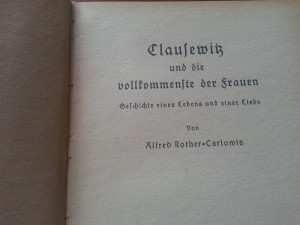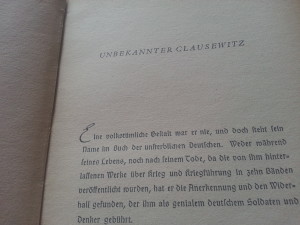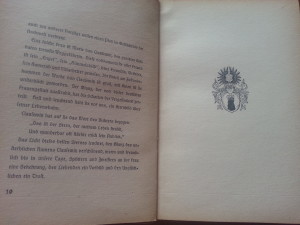Welcome back! I am guilty of long absence and sincerely apologize for that. Sometimes life comes in between us and our best intentions. My husband came back from Afghanistan, I was busy with the government shutdown in Washington in the fall, and, yes, I have been working on Marie von Brühl’s biography.
This post is about a long forgotte biography about the two Clausewitzes, Clausewitz und die vollkomenste der Frauen by Alfred Rother-Carlowitz. Klaus Möbius, the museum curator in Burg, gave it to me as a present when I visited in the summer.

The story of the book itself is as interesting as its content. The English translation of the title should be something like Clausewitz and the Most Accomplished of All Women or maybe Clausewitz and the Most Perfect of All Women. Together with the year of publication, 1940, this should bring some poignant associations to your mind.
Herr Möbius told me indeed the bizarre but somewhat funny story that he got a couple of copies donated with their first pages ripped off. Apparently, the book was a popular gift among the members of Bund Deutscher Mädel (BDM or The League of German Girls, the female youth organization in Nazi Germany). Often the first page was signed appropriately too. After 1945, none wanted to remember how and why the book ended in their hands. Hence the first pages were ripped off.
I actually read the book from cover to cover and did not find it particularly ideological, at first sight. The author, Alfred Rother-Carlowitz, doesn’t seem to have been a fervent Nazi and for the most part, stayed truthful to the known facts. He avoided explicit Nazi or anti-Semitic remarks, steered away from direct manipulations and concentrated on the story in its own context. Rother-Carlowitz managed indeed to bring to life here and there his subjects by describing possible scenes and dialogs between Marie and Carl by using quotes from their correspondence. He told the Clausewitzes life story with the explicit angle about how her patience and support nurtured his greatness. Pretty standard stuff, right?
Of course, in the context of Nazi Germany this notion was pregnant with whole bunch of not-so-subtle messages. The image of Marie von Brühl, a patriotic woman, ever waiting at home for Carl von Clausewitz to fight his wars, selflessly supporting him, and never complaining or ceasing to believe in the German national cause, is, shortly, that of the Nazi (or rather totalitarian) ideal of womanhood.
I find it even more precarious and bizarre because Marie von Brühl was far from this sought after mystical creature. She was a highly political woman, openly questioning important men of the time, begrudging her very limited role in society as a woman and never making any secret of her ambitions to influence Clausewitz’s life and work. Obviously Marie was also a childless woman (hello, Martha Goebbels!). These unsettling sides of her character never really came to the forefront in the Clausewitz and the Most Accomplished of All Women.
So Rother-Carlowitz, although far from a fervent Nazi, understood well the ideological needs of the time. And this was what makes his book disquieting for us.


Recent Comments